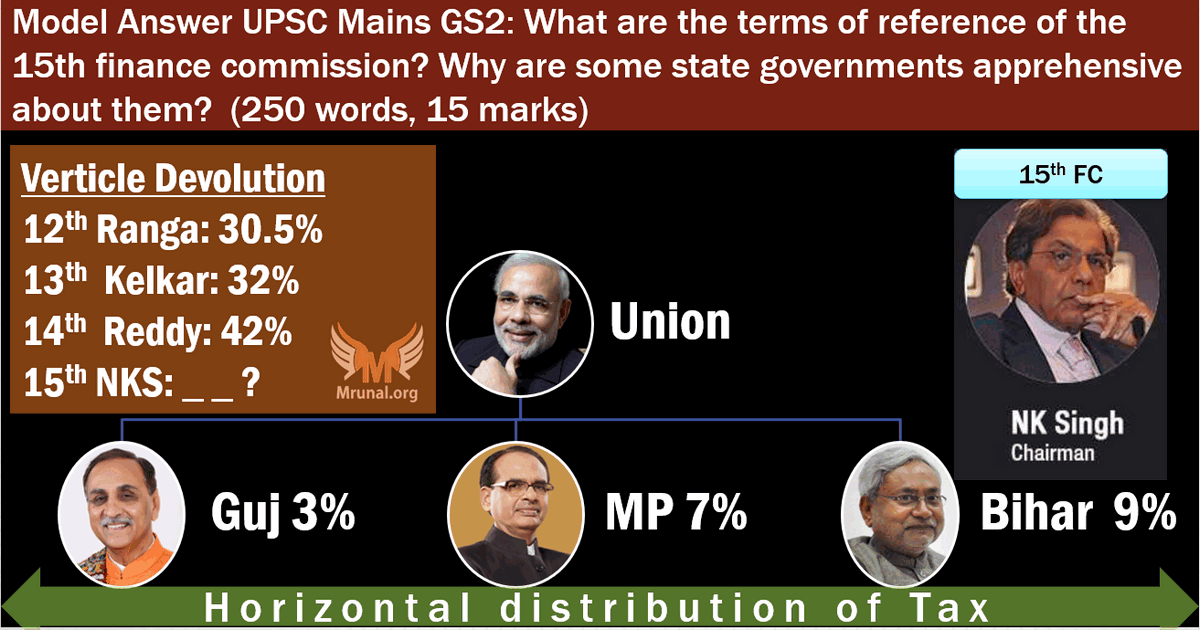- Mock Question for UPSC Mains GS2
- Introduction (Origin)
- Conclusion (futuristic note)
- Mistakes and Self-Assessment Benchmarks (SAB)
Mock Question for UPSC Mains GS2
- What are the terms of reference of the 15th finance commission? Why are some state governments apprehensive about them? (250 words, 15 marks)
- १५वें वित्तीय आयोग के विचारार्थ विषय क्या है? कुछ राज्य इस विषयमें आशंकावान क्यों है?
Relevance to GSM2-Syllabus? Polity: Issues and challenges pertaining to the federal structure, devolution of finances up to local levels and challenges therein.
To learn more about Finance Commission vs Planning commission, you may watch my old lecture video on 14th FC.
Introduction (Origin)
- Article 280: President constitutes a Finance Commission (FC) every fifth year for sharing the union taxes with the states.
- The 15th FC was setup under the chairmanship of NK Singh to suggest measures for the five years from 1/4/2020 to 31/3/2025.
- Following are the terms of reference (TOR) of the 15th FC.

Body#1: Terms of References
List not exhaustive:
- Principles governing the Verticle devolution of taxes between union and states.
- Principles governing the Horizontal distribution between the states.
- Grant in aid to states, supplement the resources of PRI, ULBs from states’ Consolidated funds.
- Performance Based incentives for States.
States fear#1: Performance based incentives
Under 15th FC TOR, commission will recommend performance-based incentives to the states depending on following parameters (list not exhaustive)
| Performance parameter | Why states apprehensive |
|---|---|
| Efforts made in expansion of GST tax-net |
|
| Efforts made in achieving replacement level of population growth i.e. Total Fertility Rate 2.1 or lower | Northern states’ total fertility rate higher, so they’re apprehensive. |
| Controlling the expenditure on populist measures. | Southern states have been running populist schemes for free TV, Fridge, Mixer, farmers’ debt-waiver, Idli at 2 Rupees etc. Similarly Northern states run free bicycle, free mobile & laptop schemes. They fear they’ll be reviewed negatively, and union will get to keep more money for itself. |
| Behavioral changes to end open defecation. | States resent that Modi’s Swatchh Bharat mission is ‘imposed upon them’. FC devolution is their Constitutional right, and not an alm (खेरात) tied to their implementation of central schemes. |
States fear#2: New India-2022
- 14th FC had recommended 42% verticle devolution.
- 15th FC TOR asks the commission to examine the impact of 42% devolution on Union government, including its New India-2022 Vision (Housing for all, doubling farmers’ income). States fear that Union will use it as an excuse to keep more funds to itself, and the devolution may be reduced to less than 42%.
States fear#3: Census-2011
- 14th FC had used Census1971 formula for horizontal distribution of taxes among states. Census-1971 population was given 17% weight i.e. more populous state will get mode funds.
- 15th FC is ordered to use the Census2011 data.
- Southern states have reduced their fertility rate between 1971 to 2011 (observe following graph), whereas Northern states could not achieve so due to poverty, illiteracy and healthcare infrastructure.
- So, Sothern states fear Northern states will get proportionately more funds, if Census2011 is used.
States fear#4: Debt and Grants
- 15th FC will examine whether revenue deficit grants given to the states should be abolished.
- Article 293: States can’t borrow without consent of the Union.
- So, what additional conditions should the Union impose on the states when they (states) borrow from market / external sources? 15th FC will make recommendations here. States fear it’ll reduce their autonomy in raising loans from the market.
Conclusion (futuristic note)
- Sustainable Development Goal SDG#10 aims for reducing inequality within and among the countries. Goal#16 requires nations to build effective, accountable and inclusive institutions at all levels. An equitable distribution of revenue tied with performance incentives will help greatly in this regard. Therefore, we should wait till the release of the final report of 15th FC before judging its adverse impact on states. OR
- States have limited avenues for collecting direct and indirect taxes. Hence, they are more dependent on the union devolution, and apprehensive of any reduction due to TOR. Union finance minister and the chairman of 15th FC have already tried to alley their fears through letters and meetings. Picture will become clear when final report is submitted latest by 30th October 2019. OR
- (For Essay) Economic Survey 201617 had observed aid-curse in context of Redistributive resource transfer (RRT). In simple terms, the special category states received large amount of funds via planning commission and finance commissions yet couldn’t perform well in poverty removal or economic growth due to lack of accountability and poor governance. The 15th FC TOR aims to link the fund transfers with performance and accountability parameters. While states are apprehensive, but such measures are the bitter pills that we’ll have to swallow eventually to improve India’s human development and economic growth.
- Don’t give long list of the suggestions, and don’t digress to unsolicited suggestions like “Southern states should help Northern states in their family planning programs.”
Mistakes and Self-Assessment Benchmarks (SAB)
| Parameter | Marks | Benchmarks |
|---|---|---|
| Introduction | 0-1-2 |
|
| Conclusion | 0-1-2 |
|
| Body | 0 to 4 marks |
|
| Logical structure | -1 to 0 |
|
| Concise expression | -1 to 0 |
|
| Language | -1 to 0 |
|
| Total Marks out of 15 | 0 to 8 |
|
Visit Mrunal.org/Mains for more on UPSC Mains Answer-writing for General Studies Paper-2 (GSM2).

![[Lecture] Mrunal’s UPSC GSM3-2020 Model Ans: Science Technology, Internal Security & Border Management Questions from last Mains Exam Solved!](https://mrunal.org/wp-content/uploads/2021/11/AD-GSM3-2020-IntlSecu-fb-500x383.jpg)
![[Lecture] Mrunal’s UPSC GSM3-2020 Model Ans: Agro, Food Proc, Environment, Disaster Management](https://mrunal.org/wp-content/uploads/2021/11/ad-gsm3-20-agro-TB-500x383.jpg)
Leave a Reply